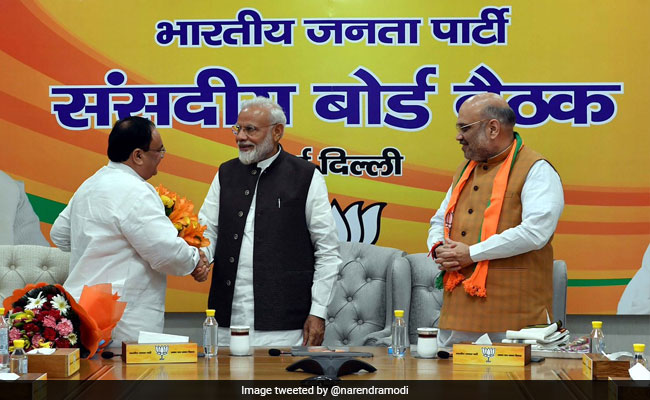From deciding the sale of Air India to the repeal of Article 370 (ending Jammu and Kashmir's special status), appointing Arif Mohammad Khan as the Governor of Kerala it's Home Minister Amit Shah who is the embodiment of Modi 2.0's #Goals.
Shah, 54, commands the sort of heft and power that his predecessor Rajnath Singh could only dream of. He is a first-time member of parliament from Gandhinagar, the former constituency of BJP founder LK Advani (Shah used to be his election manager) but rookie status is just a technicality, he has emerged as the belligerent, take-no-prisoners face of the treasury benches.
"I have never seen any first-time minister and MP display this sort of confidence. Shah-ji has hyphenated this government, now it is the Modi and Shah government," said a BJP minister, half laughing and wholly unwilling to go on record.

Amit Shah has been the closest confidant and chief strategist of Prime Minister Narendra Modi for years
Significantly, the Modi and Shah tandem act so far is free of any fractious tension or ego clashes. It continues to be as smooth as it was when Shah was BJP president. The BJP has seen double acts with Atal Bihari Vajpayee as PM and Advani as his deputy, but theirs was not a seamless exchange.
Shah is so indispensable to Modi that he continues as party president (though the BJP swears by the one-man-one-post rule); as working president, JP Nadda serves as Shah's delivery agent. Shah is still calling all the shots in the party and the preparation for the upcoming elections in three states is being micro-managed by him and his favourite General Secretary, Bhupender Yadav.
As a sign of his eminence, Shah was asked by Modi to move in to the Krishna Menon Marg bungalow earlier occupied by Vajpayee. Shah moved in last Tuesday.

BJP's Working President JP Nadda with PM Modi and Home Minister Amit Shah
The repeal of Article 370 and the aftermath including the lockdown in Kashmir is Shah's project. Twice a day, Shah meets Arvind Kumar, the Intelligence Bureau chief and Samant Goel, the chief of the Research and Analysis Wing (R&AW), along with National Security Advisor Ajit Doval for a Kashmir-specific briefing.
It helps that Shah, along with Modi, picked the two internal and external security chiefs.
Shah may bristle at the comparison but a senior Home Ministry official who was a joint secretary when P Chidambaram was Home Minister says both the men share the same approach to decision-making. "Both are zealous about power but take decisions quickly and own policy. In comparison, (Rajnath) Singh used to be cautious, constantly looking over his shoulder," the bureaucrat commented.

Amit Shah took over Home ministry from the party's senior leader Rajnath Singh
The decision to press for Chidambaram's arrest in the INX media case was also taken jointly by Modi and Shah. The duo had several points to make. The first: send a message to the opposition that from now on, political cases of alleged corruption would move aggressively. Two: that it is pay back time for the various cases that Shah was prosecuted for including alleged fake encounters and extortion when Chidambaram was Home Minister. Three: the opposition is being told fall in line or face the agencies. The recent interrogation of Raj Thackeray by the Enforcement Directorate drives home the same point. Thackeray, an effective orator and the chief of the Maharashtra Navnirman Sena, had, ahead of the general election, launched an innovative campaign with PowerPoint presentations mocking Modi. The upcoming Maharashtra elections could demonstrate whether Thackeray's ability to and interest in campaigning against the BJP remains undented by his interaction with the Enforcement Directorate.
The lengthy illness and untimely death of Arun Jaitley, who was a trusted counsel to Modi, has also seen Shah expand his role to fill the vacuum.

Amit Shah, who masterminded the party's landslide victory in elections, is the de-facto Number 2 in the government
And in appointing Arif Mohammad Khan to Kerala, Shah has reiterated his message to the BJP cadres: he has said many times in closed door meetings that "the golden period of the BJP will come when it manages to form the government in West Bengal and Kerala." BJP leaders thought that Khan, who has been supportive of the government on the outlawing of triple talaq, would be given a Rajya Sabha seat; instead he was rewarded with Governor of Kerala. Shah made the call to Khan to inform him of his appointment.
Shah also spoke recently to the Karnataka ministers rebelling against the portfolios allocated by BS Yediyurappa, the Chief Minister, and threatened that either they fall in line or be ready to face elections. Separately, Finance Minister Nirmala Sitharaman has been nudged by Shah to hold near daily press briefings to allay fears about the economy tanking. Though with GDP falling to 5 percent and bad news from all sectors, including auto, the message clearly needs to be tweaked.
Shah's unique ability appears to be making masterful decisions while being completely comfortable with the hierarchy that places him as Modi's top aide. No room for misunderstanding or insecurity here. It's an advantageous position that will only grow.
(Swati Chaturvedi is an author and a journalist who has worked with The Indian Express, The Statesman and The Hindustan Times.)
Disclaimer: The opinions expressed within this article are the personal opinions of the author. The facts and opinions appearing in the article do not reflect the views of NDTV and NDTV does not assume any responsibility or liability for the same.


